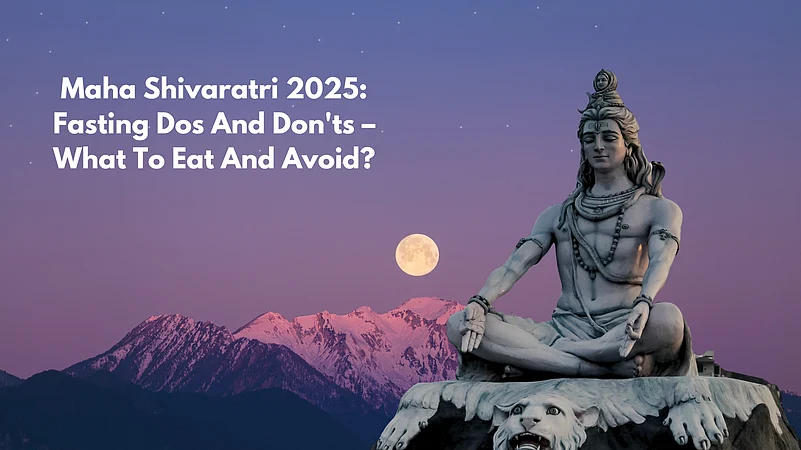The annual Hindu celebration known as Maha Shivaratri, which literally translates to "The Great Night of Shiva," is an important event that honours Lord Shiva. On February 26th, 2025, it will be observed across the world. During this period, devotees participate in a variety of spiritual rituals, with fasting being one of the more noticeable aspects. The spiritual benefits of the fast are amplified when it is observed in accordance with strict standards. The following is a list of food guidelines, as well as the dos and don'ts for fasting during the Maha Shivaratri festival.
Types of Fasting:
Devotees can choose from different fasting methods based on their health and spiritual inclination:
Nirjala Fast: Abstaining from all food and water throughout the day.
Phalahara Fast: The consumption of just fruits, dry fruits, and beverages that are permitted, such as milk, water, and fresh juices was allowed.
Samapta Fast: Incorporating fruits, dairy products, and one sattvik meal without grains.
Do's for Maha Shivaratri Fasting:
Pre-Fast Preparation: On the evening before Maha Shivaratri, have a light, sattvik dinner to prepare your body for the fast.
Morning Rituals: To cleanse the atmosphere, you should start the day by taking a bath, cleaning your living space, and sprinkling Gangajal, which is holy water.
Puja Practices: Place an idol or image of Lord Shiva in the northeast direction of your home. Raw cow's milk, Dhatura, Bhang, Chandan (sandalwood paste), Bael Patra, and other traditional offerings are welcome during the puja.
Dietary Intake: If you're not on a Nirjala fast, eat fruits, nuts, and dairy items at regular times to keep your energy up. When you make food, use flours like Kuttu (buckwheat), Singhare (water chestnut), or Rajgira (amaranth).
Hydration: Drink ample fluids such as water, milk, buttermilk, and fresh juices to stay hydrated.
Evening Rituals: In the evening, consider consuming an alkaline vegetable soup to maintain pH balance. Refrain from eating anything thereafter.
Spiritual Activities: Engage in reading holy scriptures like the Shiv Chalisa, meditate, and chant mantras dedicated to Lord Shiva.
Charity: Perform acts of charity, such as donating food or essentials to the needy, as a form of seva (selfless service).
Don'ts for Maha Shivaratri Fasting:
Prohibited Foods: Avoid consuming grains, legumes, onions, garlic, and certain vegetables like brinjal. Non-vegetarian foods, eggs, alcohol, and tobacco are strictly prohibited.
Cooking Ingredients: Refrain from using regular table salt; instead, use rock salt (Sendha namak). Cumin seeds, cinnamon, green cardamom, cloves, black pepper, and red chilli powder are the only spices that should be taken into consideration.
Offerings to Shiva: It is customary to refrain from offering the Shiva Linga ketki flowers, turmeric, or coconut water.
Beverages: Avoid caffeinated drinks like tea and coffee, especially if you're on a liquid diet, as they can lead to dehydration.
Packaged Products: Foods and drinks that have been processed or packed should be avoided since they may include additives or preservatives that are not appropriate for periods of fasting.
Personal Grooming: It's advisable to avoid cutting hair or nails on this auspicious day.
Breaking the Fast:
You should start your day after Maha Shivaratri with a bath and a short prayer session. Light, easily digestible meals are ideal for breaking a fast. Yoghurt and other probiotics can help your digestive system and gut repair.
Health Considerations:
A spiritual discipline, fasting requires you to pay great attention to how your body reacts to the observance of this discipline. Individuals need to consult with their physician before beginning the fast, particularly if they are dealing with diabetes or are pregnant. If you want to maintain your strength throughout the day, you should make sure that you consume enough amount of water and nutrients.
By following these rules, followers of Lord Shiva can honour him with love and discipline, making sure that Maha Shivaratri is spiritually fulfilling.

















